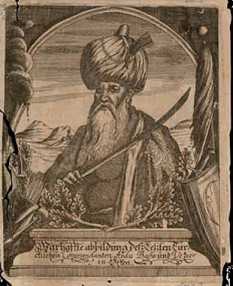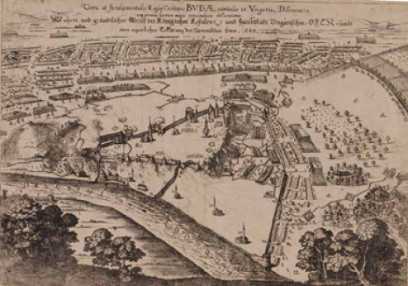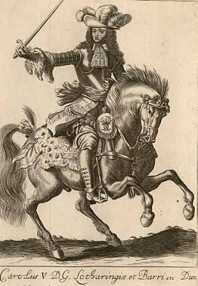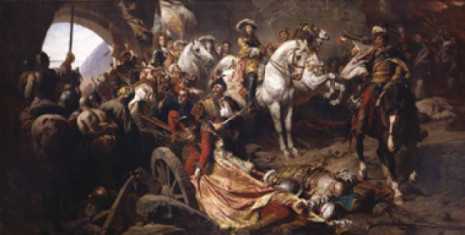The Recapture of Buda – September 2, 1686
Szöveg: hungariandefence.com | 2011. szeptember 2. 6:06Three hundred and twenty-five years ago, on June 21, 1686 a more than 80,000-strong army started laying siege to Buda Castle. During the 78-day siege the attackers launched a total of three all-out assaults on the castle. The last one took place on September 2, when the imperial, Brandenburgian and Hungarian troops advanced into the castle from the direction of the Esztergom round bastion on the north, while the Bavarian forces from the Stephen tower on the south side, and occupied the former Hungarian royal seat after a short fighting. We commemorate the historic event by excerpting from the book “For the Homeland Unto Death – 1100 years” published by Zrínyi Média, which is available in our Digital Library.
The recapture of Buda

astonishing contempt for the death as it awaited
them at every point. The greatest danger and
endeavour fell to Spinola. The captain of the
castle himself, with the finest of his remaining
guard, was defending the rubble of the gaping
wall, imploring Mohamed with their usual
shouts to aid them from above, inciting their
own fervour, and mowing down the attacking
lines with well-aimed volleys. Among the first
to fall was Baron d’Asti with the finest of
the volunteers, but this could not deter the
Germans, who surged forward over the corpses
of their comrades, through the thick hail of
musket balls. The losses only further aroused
their fervour. The Turks bitterly resisted, and
it seemed that such equally matched bravery
would long keep the fortunes of war equal on
each side.
In the meantime, at the other side, Ötting
was climbing the slope, investing the ruins
among the determined fire of the Turks,
giving Spinola breathing space, with a decisive
breakthrough reaching the houses near to
the walls. The janissaries, firing everything
into the air, as if sensing the end, dragged
every weapon they could to that spot. One
side for their lives, the other for victory, both
engaged in a ferocious struggle to the end of
their strengths. Those who had been holding
up Spinola now rushed to where the more
immediate threat lay. Spinola now joined
forces with Ötting, packing together the ranks
and forcing the Turks backward, step by step,
and commencing a new advance. The fallen
troops were replaced by fresh waves, the fire
not letting up for a moment. It was pressure
that the Turks could not withstand, a vision
of impending destruction. Confusion spread
among them, they fell on the open ground.
Taking new courage from this, the attackers
tore down the stakes, the spiked beams and
all the other obstacles, and burst on to the
main square. The reserves followed close
behind, and soldiers invested every place. Too
late, the Turks raised the white flags, some
having fled to the houses opposite,
under the castle, but most to the
castle precincts. Few escaped with
their lives. Armed and unarmed alike
were cut down without distinction in
the soldiers’ unrestrainable rage. The
streets became rivers of barbarian
blood, the once-flourishing town
defaced by dreadful butchery.
Charles of Lorraine was
observing all this from the corner
turret, and sent Prince Commercy
to the Emperor as the bearer of
good news. He ordered Souches to
restrain the troops from slaughter
and looting, and to line them up in
battle order within the town. Croy
took control of the market and the
main points. As the orders were
being given, a troop of desperate
janissaries assembled in Zsidó utca
(Jews’ street) and, spurred on by
the captain, went back into action,
a clash that proved hard rather than
long for their opponents: after firing
their balls and thrusting with their lances,
they ran towards the palace to avoid being
encircled. Only the captain stood his ground,
cursing his subordinates’ pusillanimous
conduct, and, bleeding from many wounds,
the brave leader died faithful to his calling.

victors, advancing along streets broken
up with trenches and ramparts, came up
against new dangers. They had to fight for
every cobblestone of Buda. They broke the
Fehérvár gate and a mass of servants flooded
in. They hounded their prey in all directions.
The Turks broke out of the palace. Some
were killed, the rest forced to flee, their
battle order breaking up, the generals having
incautiously loosened up the ranks, giving
way to the fleeing mob.
This action was the Turks’ last effort. By
this time every wall, fortification and street
had been taken. The Turks, fiercely defending
the palace, came under attack from behind
led by Prince Croy. This was to the aid of
the Bavarians, who had still not finished the
intensive siege. They launched their assault
somewhat later than the imperial forces,
and lost 150 men at the first advance, which
halted them for a while. Then they resumed
their fight, and across innumerable obstacles,
pressed the enemy into the square enclosure
of the gardens. The contest ended only when
(seeing Croy and the fires of the alreadytaken
town), all of the Turks were huddled
into a square surrounded by a double wall
and, throwing down their weapons, pleaded
for their lives. The Bavarian general asked
the commander what should be done with
the barbarians. Lorraine entrusted the matter
to the Elector. Strattman persuaded them
to accept the surrender, saying it would be
inglorious for Christians to be unmerciful
against soldiers who had fulfilled their offices
courageously to the last. Serényi laid down the
conditions of surrender.
Four imperial and a few Brandenburg
battalions were stationed in the town, the Serau
regiment held the ruins, and a robust guard
was mounted around the town to block any
means of escape. The same precautions were
taken with the palace. Among the witnesses
to the victory was the Vizier, who, as was his
custom, had led the army to the heights and
quickly retreated after seeing the disaster with
his own eyes. After seeing that all was in order,
both generals, covered in the dust of glory,
returned to camp. The butchery and looting
continued through the night, although fires
broke out in many places, preventing much
of the booty from falling victim to soldierly
greed."
Buda in Christian hands again
The siege of this great city, dominating broad
lands, had come to a sad end for the Turkish
Empire, and a fortunate one for Christendom,
although at the price of much endeavour and
prayer. When news of the victory spread, there
was neither nation nor church throughout
Europe which did not consider the taking of
Buda to be as much to its own benefit as to
Leopold’s. Prayers were offered in many places,
feasts and other ceremonies of congratulation,
and gifts were distributed among the people.
In Buda, the generals marched in triumphal
procession into the city, and after St Stephen’s
church had been cleared of barbarian filth,
they sang the hymn of St Ambrose. After
giving their pious thanks to God, the author
of the victory, they held a review of the
arsenal, which the besieged Turks had carefully
protected from fire. They found 200 guns of
assorted calibre, vast quantities of matériel and
victuals for several months.

there, had not the stink and fumes of the dead
men and smoking houses been overpowering.
They placed the 4000 soldiers under Thüngen
as temporary guard in the city. The Turks who
had given themselves up were ordered to burn
the corpses, and the workmen were engaged
to start rebuilding the fortifications. The city
had been cast into a state of dreadful and
almost unimaginable filth. Several thousand
dead bodies lay on the streets, a sight made
all the sadder from there being not only men,
but women and children lying dead from their
many wounds, a sight pitiable even to those
who had killed them. There was not a house
which was not shot with holes, torn apart or
burnt down.
Above all they were pained to see the
palace, which they remembered in its former
glory, or knew of it from history. Of this
dazzling royal seat, built to display royal
grandeur, there remained nothing but holed
and tottering walls; collapsed vaults, palaces
and council halls; horribly crushed banqueting
halls; stunted towers; broken promenades; and
gaping cellars from whose depths all kinds
of pestilential vapours wafted out. Once the
domain of royal pomp (however modest its
dimensions), much of the area was almost
impassable from piles of rubble and heaps of
unburied corpses. The rest could not so much
as be approached for several days, less because
of the danger of ambush (in which every
barbarian is skilled), as for the ruins sticky
with blood and heaped with rank corpses; a
sight as dreadful as the threat of infection for
anyone reckless enough to come close.
The prisoners displayed an awful savagery.
Despite being treated more mildly than they
might have expected, they rather preferred
death to life and cursed their misfortune in
not falling together with their beautiful Buda.
Others would not let food pass their lips, or
cried and sobbed (not daring to lament), until
they were distributed among the victors, when
they gradually came to themselves and calmed
down. A more fortunate survivor of this
disaster was the castle captain’s deputy, Csonka
Bey, Aga of the janissaries. Wagner writes
thus: This had a decent bearing, and a moral
stature that merited his becoming Christian; in
holy baptism, he received the name Leopold
from his patron the Emperor, was conferred
the rank of knight, and from then on fought
nobly as a Hungarian colonel on the Rhine.
His son still lives, and has followed in his
father’s footsteps. Csonka Bey, of whom we
speak, said that there were 10,000 janissaries
in the city guard, and apart from the cavalry
and other forces there were about 6000 who
came to the city when the siege began.
Sorrow of the Turks,
joy of the Christians
No mind can grasp, and no fine words express
the depth of sorrow which took hold of
the Turks after the capture of the city. Over
more than a hundred and fifty years, they
had so greatly come to love the hospitality of
this city, which commanded such extensive
lands (most of Hungary being ruled from
here), had such a pleasant situation, and was
bountifully endowed with all that was needed
for a comfortable life. It afforded a broad
view to the deep and wide plain, the air was
wonderfully healthy, the city was suited to
construction of the warm baths so favoured
by the Turks, and the Danube, flowing in the
narrows between the city and Pest, presented
such a spectacle that everyone’s heart ached
upon recollection of lost Buda.
In a plea that such stormy times should not
rage further, they ordered prayers in all parts
so that Mohamed’s heart be moved by prayer
for the people whom fate had dealt so unjust
a blow. The barbarian preachers scolded the
people for their sins, in punishment of which
God had sent a plague on the then flourishing
empire. The preachers, by word, tears,
lamentations and even loud cries, beat home
to them that they must raise their morals even
higher, and urged them to be generous in alms
to the poor, even if they be Christians or Jews,
and by these pious acts plead to the god of
Mohamed, to persuade the one great God to
hear the prayers of the afflicted people. It was
not just the common people who were moved
by this spirit: the Sultan himself sought the
blame not in fortune or the cowardice of the
Vizier, but in his own and his people’s sins –
either because he indeed felt so, or because
by feigned good advice he would reassure
the vizier, who feared for his life. The latter
presented the Sultan with the enormous lie
that he had faced 160,000 spirited Christians,
and so could not have helped Buda. The
prisoners sent to Constantinople were obliged,
under oath, to confirm this lie. That was how
affairs were among the Turks.

Strattmann held a council of war, examining
in great detail what could be done with the
intimidated enemy in what remained of the
autumn. Some of the officers thought that
the troops, reduced in number and weighed
down by fatigue, should be rested. Lorraine
might have entertained a similar opinion,
had not been seized with a vision of the next
year’s campaign; he thought it better to force
the terrorised enemy as far from the limits of
Buda as possible and to take under his control
the neighbouring castles, by surrender or by
force.
Under Beck’s command, a 6000-strong guard
was left in Buda, and after striking the tents and
levelling the ramparts, the whole army together
with Scherffenberg, the commander of the
Slavonian contingent, marched towards Ercsi.
With scant pasture and water, they proceeded
only slowly, and reached the village of Pentele
on the right bank of the Danube. Upon learning
there that the Vizier had marched to Belgrade,
Baden and Scherffenberg were commanded to
take the forces assigned to them – there were
13 regiments other than the Scherffenberg
contingent – to march on Pécs without delay
and lay siege. Caraffa took the remaining troops
across the Danube towards Szeged, and then
had to find winter quarters in Upper Hungary.
There is no space here to relate all of the
deeds which merit eternal memory and high
laurels in the capture of Buda and other
events that autumn. Charles of Lorraine
stopped for a while at Kalocsa to observe the
enemy’s attempts and his own troops’ military
fortune, and then crossed the Danube so that
the hitherto divided armies could assist each
other, and finally, in late October, marched
triumphantly into Vienna.
Excerpts from Mátyás Bél’s book (originally written in Latin)
on the recapture of Buda (Zrínyi Kiadó, Budapest, 1986)